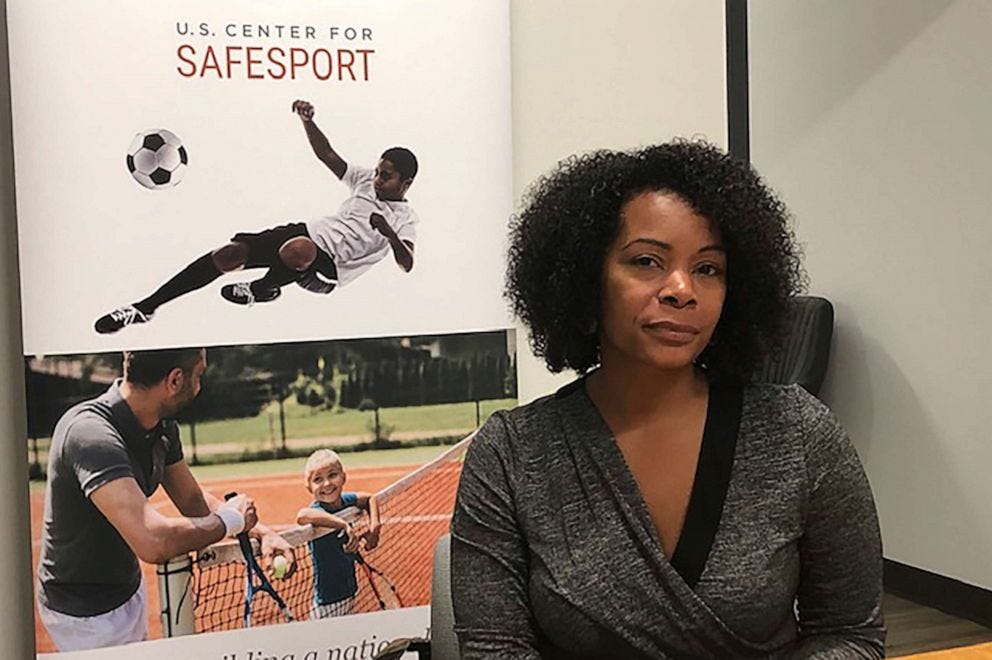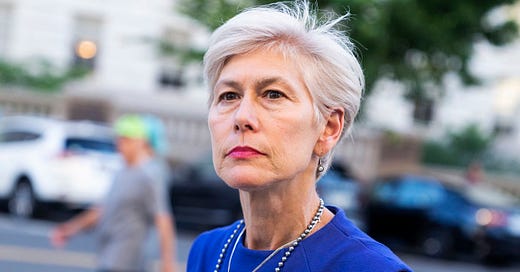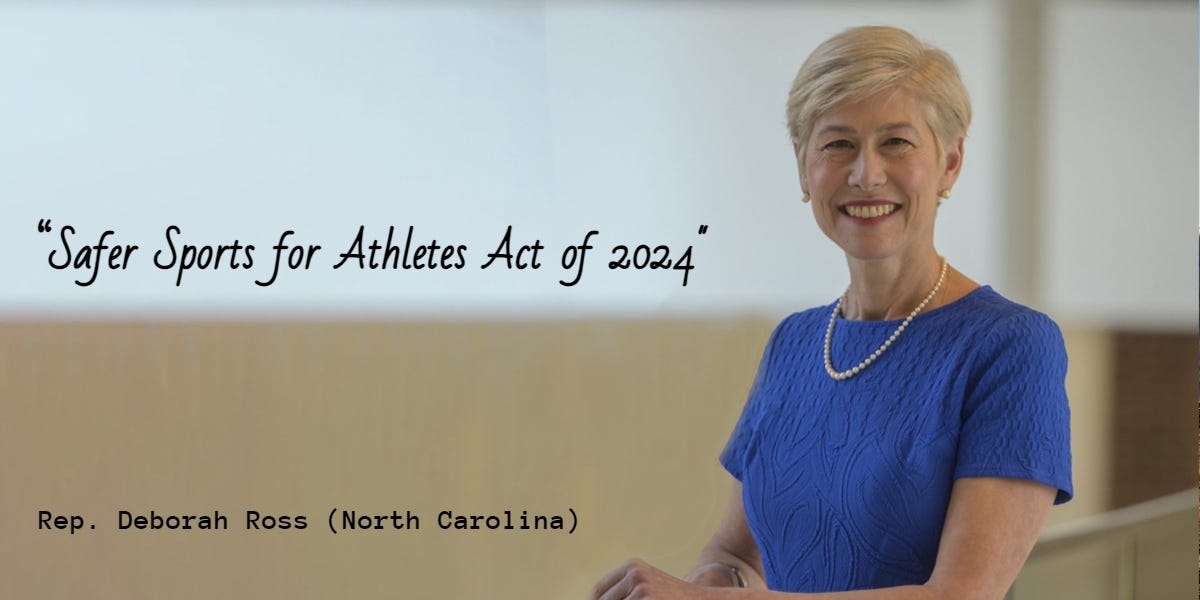It is mentioned in today’s issue of The Sports Examiners, which released the news story below at 12:14 am (Pacific time).
Colon estimates SafeSport needs $30 million a year
At a well-attended hearing of the U.S. House Energy & Commerce Committee’s Oversight & Investigations Subcommittee, U.S. Center for SafeSport chief executive Ju’Riese Colon (pictured below) told legislators that an annual budget of $30 million is needed to deal with the current flood of cases:
“Based on the trajectory of cases, I would say that our budget needs to be around $30 million.”

Rep. Diana DeGette (D-Colorado), who has pushed for more governmental funding of SafeSport, observed, “One of the reasons we have these long delays right now, is because you simply don’t have enough investigators to investigate it as far as you want to.”
Colon agreed, and added “If we are to get 25%, 50%, 100% more cases over, let’s say, the next 3-5 years, we will continue to have this conversation [about delays].”
The Center’s 2022 Annual Report showed total revenues of $23.76 million, of which $20 million came from the U.S. Olympic & Paralympic Committee and $2.39 million from the Federal government (94.2%).
Colon was one of four panelists, also including Nicole Deal, Senior Vice President for Security and Athlete Safety of the U.S. Olympic and Paralympic Committee, former NWSL soccer player Mana Shim, now Chair of the U.S. Soccer Federation Participant Safety Task Force, and Craig Cress, chief executive of USA Softball.
Shim crystalized the view of many, noting “abuse in our sport was rooted in youth soccer,” and listing the primary legislative reforms desired by athletes and U.S. National Governing Bodies:
● “First, we need increased transparency by SafeSport. The lack of information sharing is standing in the way of protecting athletes from abuse. If SafeSport does not share information about the allegations it receives, its investigative process, or any findings it might make, we cannot develop an understanding of what appropriate safety measures can and should be instituted.”
● “Second, we need to limit the number of SafeSport investigations that end in administrative closure. Administrative closure is when SafeSport closes a matter without any findings, resolution on the merits, sanctions, or public record of the allegations.
“The administrative closure process leaves parties in limbo indefinitely or, worse, allows sexual predators to fall through the cracks and remain in the sport without restriction. This problem is made worse by the sheer volume of cases SafeSport ‘resolves’ in this manner. In soccer, approximately 89% of all cases involving sexual misconduct with no criminal disposition are administratively closed.”
● “Third, we need to ensure that U.S. Soccer and other NGBs can take action when SafeSport does not. When SafeSport administratively closes a matter, it maintains exclusive jurisdiction. If an NGB like U.S. Soccer tries to take any sort of action to protect athletes, SafeSport will report them to Congress and initiate an investigation against the NGB. We believe that NGBs should be allowed to take some form of action in cases following an administrative closure so they can ensure abuse does not occur in the future.”
● “Finally, we need to rethink the appeals process. SafeSport’s appeals process gives respondents who are found to have engaged in harassment or abuse the right to an entirely new fact-finding process. Rather than rely on the record of the original investigation, victims of abuse who were brave enough to participate in an investigation are forced to go through the process all over again.
“In cases where the victim is unwilling to participate in a second proceeding, SafeSport has vacated its findings, or arbitrators have overturned SafeSport’s decisions, resulting in SafeSport lifting sanctions against abusers, even after they had been found by substantial evidence to have committed sexual misconduct.”
Cress explained that the logic behind the original, 2017 SafeSport legislation was sound, but no longer applies:
“There seems to be an assumption that, by regulating the NGBs, all youth sports participants are covered and protected; however, that is an incorrect assumption.
“In just our sport of softball, there are at least 25 other organizations that are conducting softball events that are not obligated to meet SafeSport requirements or adhere to SafeSport policies, including the Minor Athlete Abuse Prevention Policies.
“This means that there are hundreds of thousands of youths participating in play where the adults are not SafeSport-educated and potentially not had any background check screening in just the sport of softball alone. Those athletes are as equally important and equally deserving of protection as the athletes participating in USA Softball programs – yet they are not receiving the benefit of those policies and procedures.”
In fact, Cress and Subcommittee Chair Rep. Morgan Griffith (R-Virginia) both noted that some of these unregulated leagues actually promote themselves by stating that SafeSport oversight does not apply!
Colon was closely questioned about administrative closures; she explained:
“An administrative closure for us is a way for us to maintain the ability to re-open a case. ... We hold on to cases in many instances through administrative closure to ensure we’re able to [allow survivors to go forward when they are ready.”
She acknowledged that the administrative closure procedure need to be “used more judiciously in the future” and that new processes are being developed. But Colon also said she wants to retain jurisdiction and not turn the cases back to the NGBs:
“I’m against that. ... One of the reasons that we keep cases when we administrative close them is the ability to re-open them. What we would not want to happen is that if we were to hold that case, then the NGB would start to investigate again.
“We’ve had instances where athletes have called us and say, ‘Hey, wait a minute, SafeSport, you told me you were going to give this a hold, and then I got a call rom my NGB. We don’t want that to happen.
“We do recognize, however, that NGBs need additional information, however, in order to make better decisions, whether that is around safety planning, membership decisions or employment decisions.”
U.S. Soccer’s Shim said, “We see administrative closures, and have to affirmatively allow what we see as bad actors to re-enter our sport. And that’s an obvious problem.”
Another issue which surfaced was the maintenance of SafeSport’s Central Disciplinary Database, which includes individuals currently on suspension, but any mention of someone who has finished their sanction period is removed. In the parallel world of doping, there are extensive databases of athletes who have concluded their sanctions, but the information about their offense, and any sanctions and time served are available.
Deal explained, “It’s not evergreen. If someone has a suspension for two years, they’re on that CDD for two years and then they are removed. So what we are seeing now are the different NGBs putting that evergreen list on their sites.”
Colon added, “We also would also like to be able keep people on the CDD longer, we would require a legislative change to be able do that. I would also like to see other organizations outside of the Olympic and Paralympic Movement make use of this more regularly, so that when we are banning people from sport, they are not introducing them into other sports programs across the country.”
A bill in development by Rep. Deborah Ross (D-North Carolina) tentatively titled the “Safer Sports for Athletes Act of 2024" will apparently be introduced soon and is being written to address multiple issues that were discussed in the hearing.
~~~~~~~~~~~~~~~~~~~~~~~~~~~~~~~~~~
More Links Related To Both Hearings:
Sen. Cruz: SafeSport Faces Serious Challenges In Carrying Out Its Mission (Statement) (March 20)
Sen. Cruz: SafeSport Faces Serious Challenges In Carrying Out Its Mission (News) (March 20)
Subcommittee Chair Griffith Opening Remarks on U.S. Center for SafeSport (March 21)
Chair Rodgers Opening Remarks on U.S. Center for SafeSport (March 21)
US Youth Soccer Statement (refraining from commenting on any of the 12 CSUSOP recommendations) (March 21)
Hickenlooper Chairs Senate Hearing on Athlete Safety in Olympic Sports (March 21)
Lawmakers Seek Answers On How To Protect Young Athletes (subscribed) (March 21)
~~~~~~~~~~~~~~~~~~~~~~~~~~~
As of 5:20 am. (Eastern Time), no other media had published an article about yesterday’s House hearing.
I am tipping my Deaflympics cap to Editor Rich Perelman for listening to the hearing via YouTube and writing it down for all of us.
If you want to read the Olympic sports coverage from A to Z, click this link to sign up for the free E-Mail Updates.




